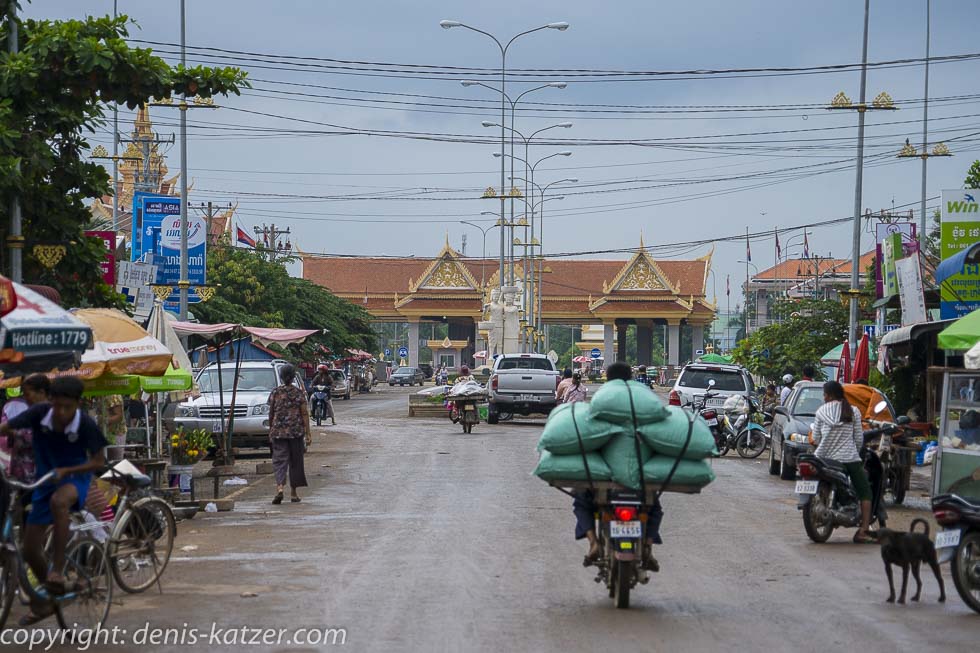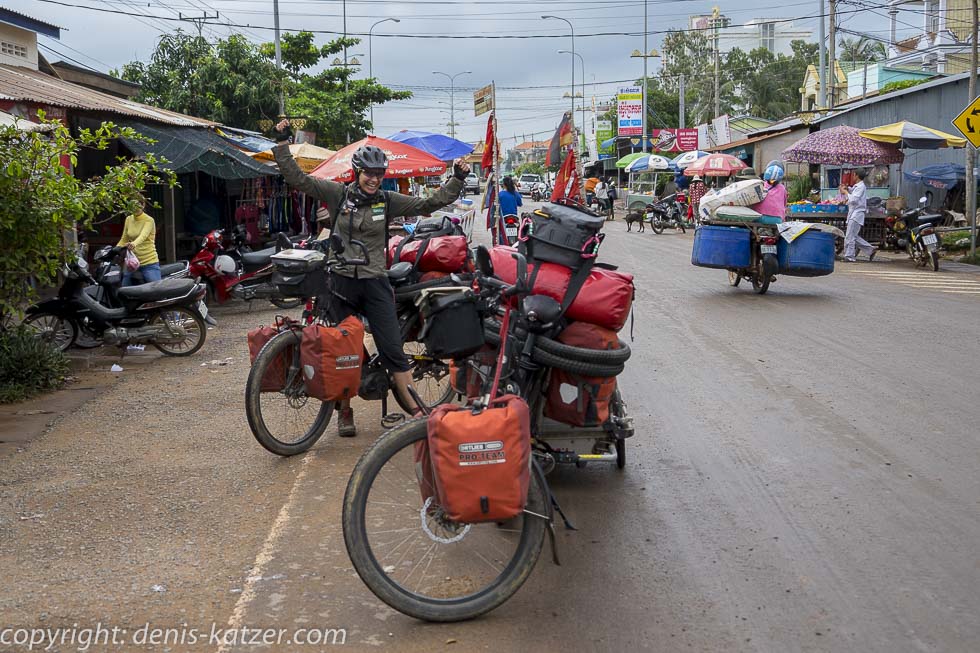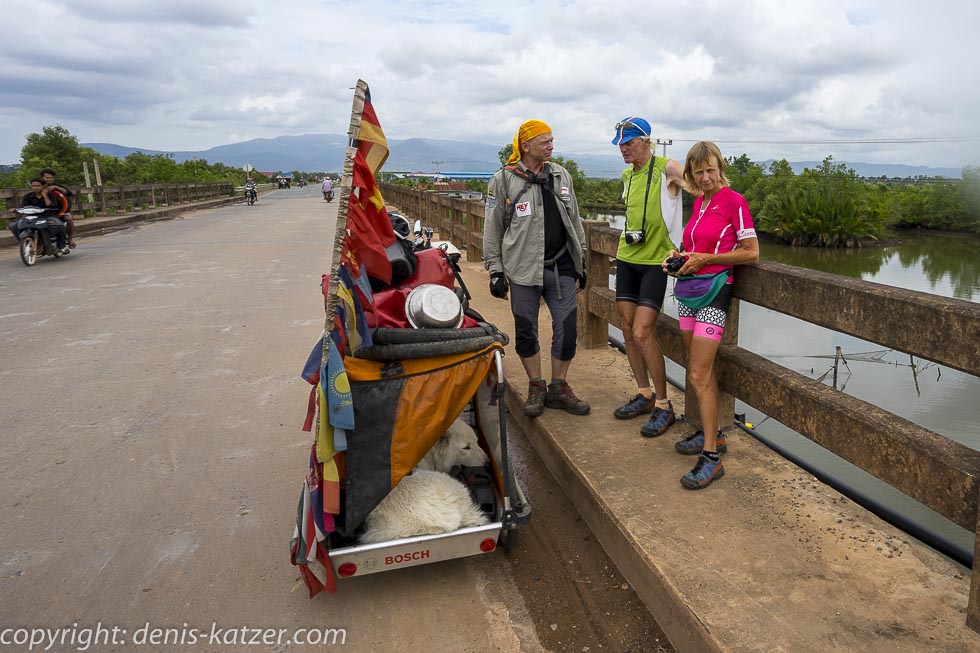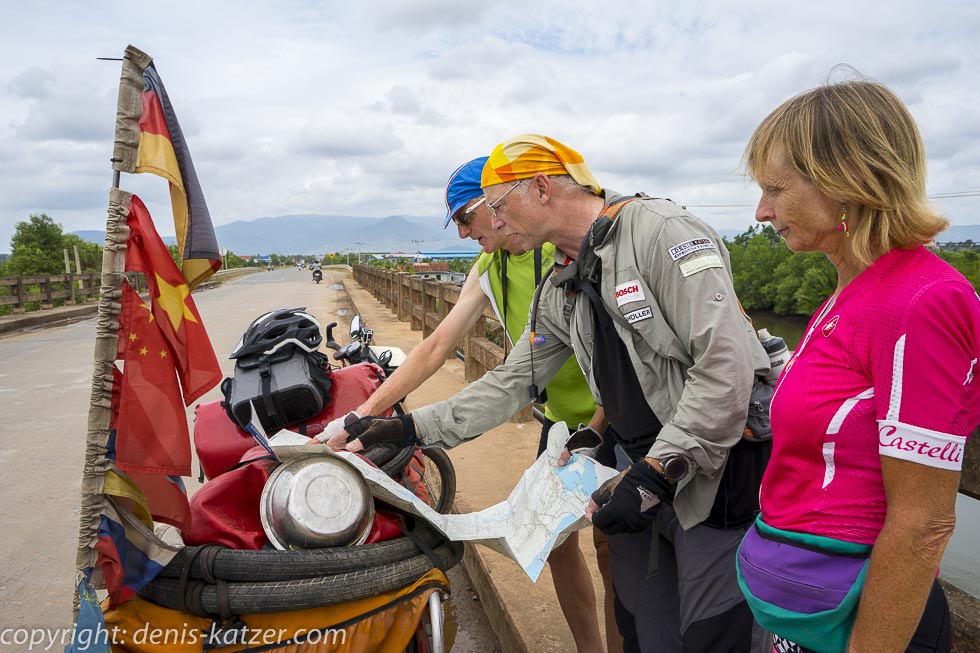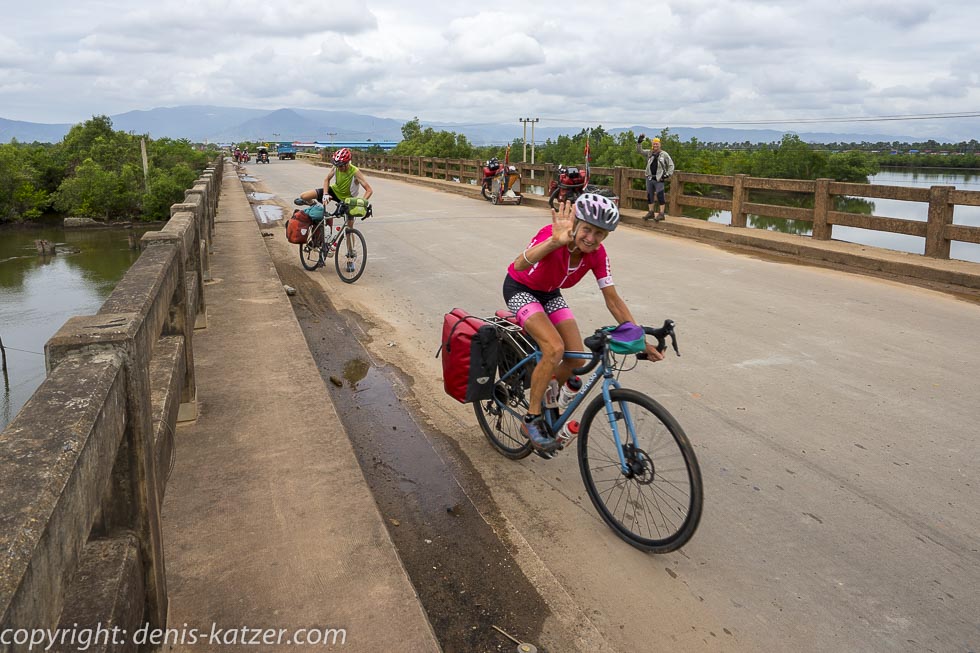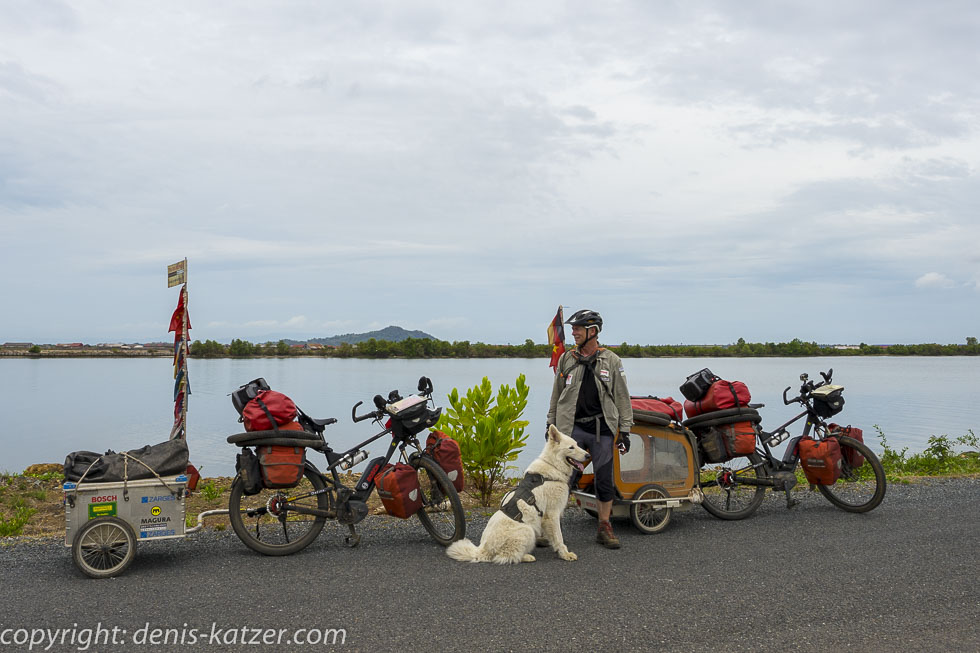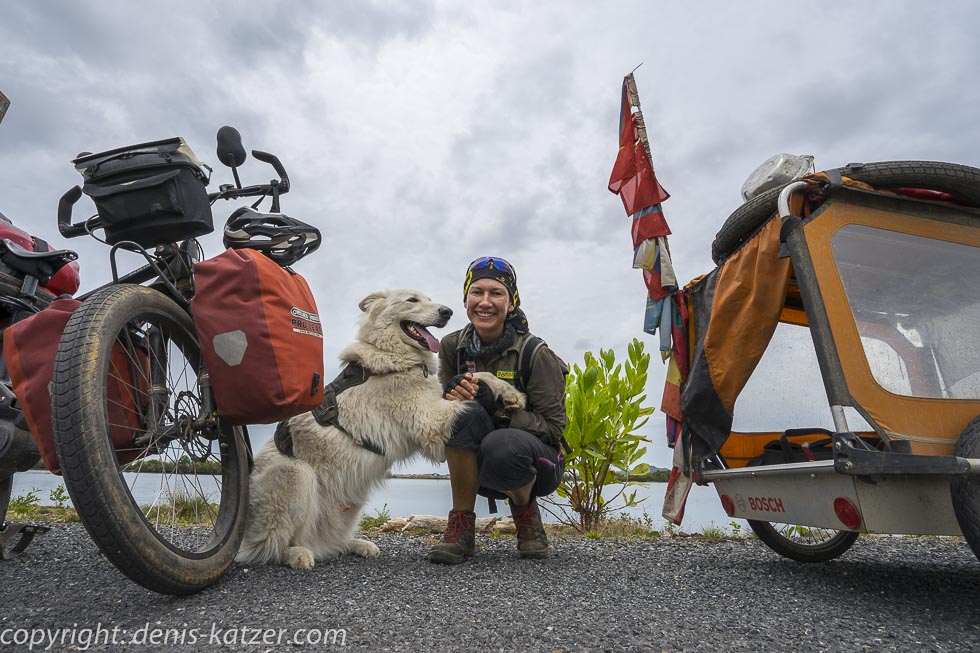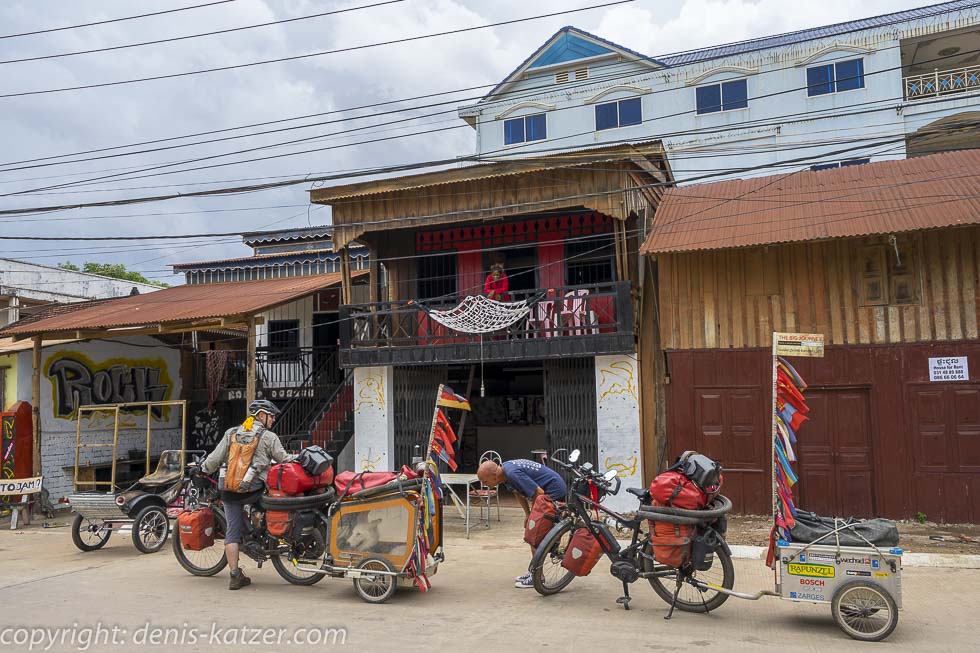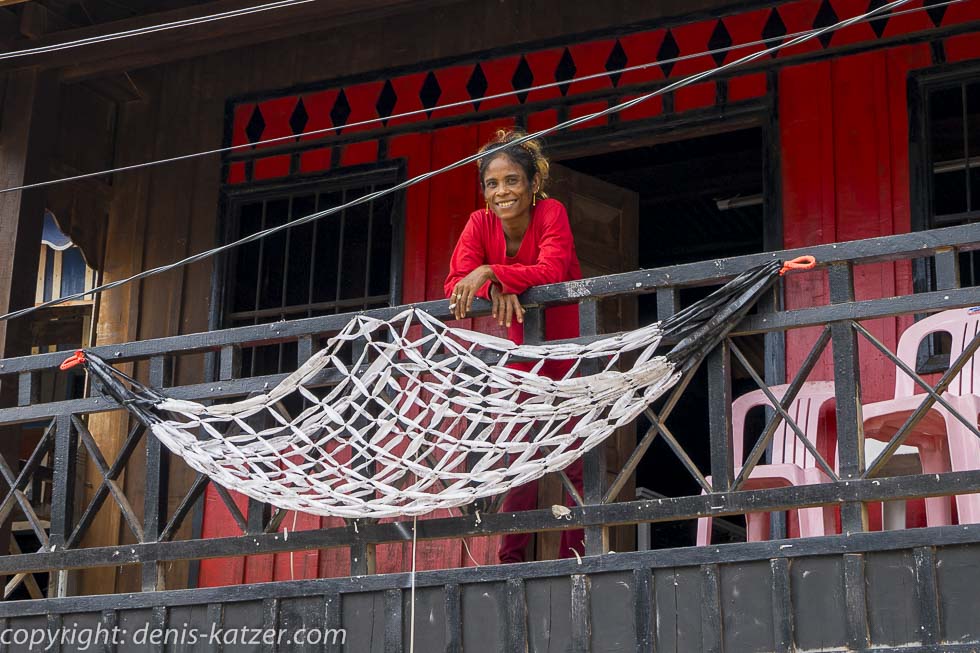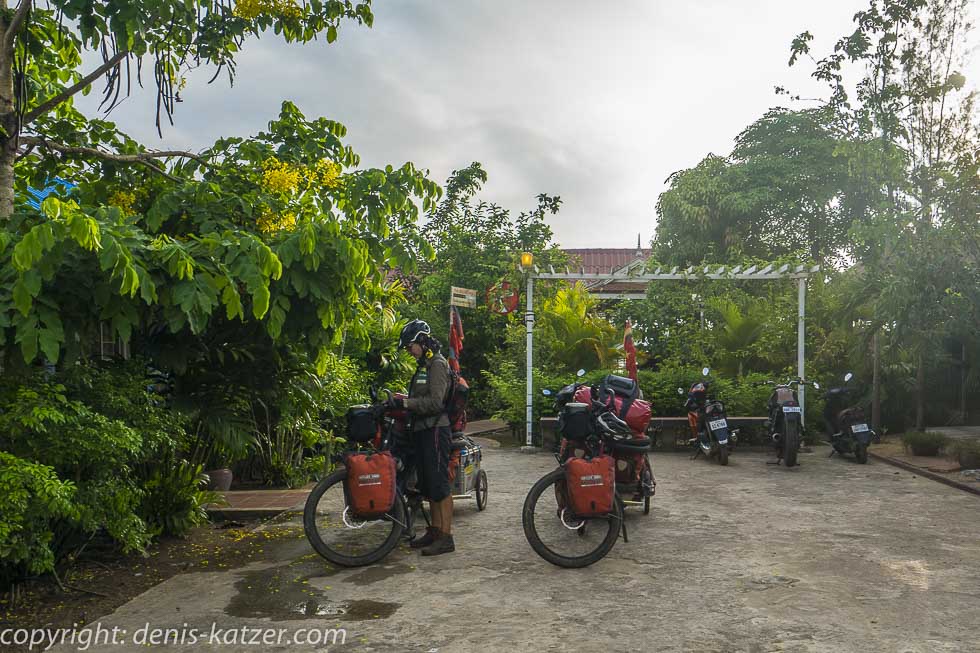
Across the border to Cambodia – summary of the trip so far
N 10°36'39.0'' E 104°10'25.3''
Date:
02.04.2017
Day: 642
Country:
Cambodia
Province:
Kâmpôt
Location:
Kampot
Latitude N:
10°36’39.0”
Longitude E:
104°10’25.3”
Daily kilometers:
65 km
Total kilometers:
23,393 km
As the crow flies:
41 km
Average speed:
22.4 km/h
Maximum speed:
29.1 km/h
Travel time:
2:052 hrs.
Soil condition:
Asphalt
Maximum height:
10 m
Total altitude meters:
70.571 m
Altitude meters for the day:
81 m
Sunrise:
06:00 a.m.
Sunset:
6:14 pm
Temperature day max:
33°C
Departure:
06:50 a.m.
Arrival time:
12:00 p.m.
(Photos of the diary entry can be found at the end of the text).
Bi bib, bi bib, bi bib!, we are woken up by our arm computers. Yawning, I glance at my arm display. 5:00. “Oh, I’m so tired,” I say. “Hm,” is Tanja’s meaningless reply. We struggle out of bed as if in slow motion. Still sleepy, we pack our bike bags for the last time today in this wonderful country. “Are you excited?” asks Tanja. “You mean because of the border crossing to Cambodia?” “Yes.” “A little bit.” “I think everything will be fine.” “I hope,” I reply, as we read on the internet just a few days ago that the three-year rabies vaccination for dogs, which is common in Europe, is not accepted in Cambodia. According to the regulations there, the vaccination must not be older than one year. Possibly a problem for us because Ajaci was already vaccinated almost 2 years ago. “I think they just don’t know about the three-year vaccination yet or haven’t adjusted the regulations on the internet. We’ll see,” I say, hoping not to get into trouble.
We roll our bikes out of the room and load them up. At 6:30 a.m., we are the only guests sitting in the resort’s large open-air restaurant and try to get breakfast. “They’re all still asleep,” I say, getting up and looking for someone from the staff. The reception desk is unmanned. I look through the glass pane into the room behind and see someone lying under a mosquito net. After knocking on the window to no avail, I enter the room and wake the woman under the net. She looks at me with wide eyes and turns to the other side to continue her sound sleep. “We’d love our breakfast,” I say, touching her lightly on the shoulder. The answer is an unintelligible mumble. “And have you found someone?” asks Tanja a few minutes later. “Yes, I hope I’ve persuaded the lady to get up.” “Now we’ve got up so early to cover a few kilometers before the heat sets in, and now we’re wasting our time here,” she says. At 6:50 a.m. we are served a soggy white bread, a small packet of rancid butter, two unfinished fried eggs and a cup of Nescafe.
Clack! Clack! Clack!, an unpleasant noise disturbs the first few meters of our departure. “What’s that?” asks Tanja. “No idea. It certainly doesn’t sound good,” I reply, stop, put the bike on the stand and look for the cause. “Can you find anything?” asks Tanja, kneeling next to me. “Hm, everything looks fine at first glance. Please push the wheel forward a few meters. Maybe then I can analyze the clacking.” Clack! Clack! Clack!, it rattles again. “Oh no. A spoke on the left wheel of the dog trailer is broken.” “Do you have to replace it right away?” “I’ll do it when we get to Cambodia. Hopefully the wheel will last until then.”
We finally leave the resort under heavy cloud cover. There is still little traffic on the road at this early hour. After seven kilometers, the Cambodian border appears, whose buildings look like Buddhist temples from afar. The Vietnamese official stamps our passports and points to the building opposite. “Thank you very much. We really enjoyed our time in your country,” says Tanja, to which the man smiles. We roll our bikes to the Cambodian border post on the other side. While Tanja looks after the bikes and Ajaci, I enter the house and hand the customs officer my passport. I am the only border crosser at this hour. While the man in uniform looks at my travel document as if it were from another planet, I sit down on one of the benches and wait. Meanwhile, my thoughts fly back to the beginning of our journey almost two years ago and land on the Trans-Siberian Railway as we drove through the forests of the endless taiga. I remember our first night in a tent in the Siberian taiga, when I thought I saw a brown bear, which fortunately turned out to be a stallion. I think of Mongolia with its vastness, the eternal blue sky, the huge herds of horses, the wandering nomads who catapulted us into a bygone age. But also the merciless Gobi desert with its heat, herds of camels and nights in the yurts. And then the border crossing to China. A country where we crossed the desert of death, the Taklamakan, 1,000 km by camel over 20 years ago. Back then, the population was not very open to individual travelers. We had had one or two bad experiences and therefore had respect and even a little fear of this country. Well, crossing the country by e-bike was undoubtedly one of the best ideas we’ve had in recent years. It was exhausting but absolutely worthwhile. More than worthwhile. The friendliness and helpfulness of the Chinese surprised us. The land of contrasts, of unspeakable diversity, of millennia-old culture and rapid progress has captured our hearts. No two days were the same. The nature is simply fabulous and often breathtakingly beautiful. We spent 9 months intensively traveling through the land of the dragon and when we had to leave, a few tears rolled down our cheeks.
The clang of a door slamming brings me out of my thoughts. I look up and see the officer, who still seems to be busy with my passport. I hope everything is okay with the visa, I think to myself. Returning to the memory, I think of Vietnam, which we cycled through in just under a year, from the far north to the far south, a distance of 6,000 km. An exotic, moving and breathtakingly beautiful country. I will never forget the friendly people, who are divided into numerous ethnic minorities. I’ll never forget the helpfulness when I broke my shoulder and the owners of the lodge took me to hospital and didn’t hesitate to pay the bill. Soon I’m thinking longingly of the endless pass roads through a fabulous tropical jungle in far more pleasant temperatures than now. I think of the dramatic cloud formation and beautiful rice terraces in the high mountain village of Sapa and in the lower-lying Mai Chau. Some of our experiences in the land of the senses were spectacular, left their mark on us and became deeply engraved in our consciousness. When I remember the junk trip in the fabulously beautiful Halon Bay, my heart sinks. Just the thought of when our faithful dog Aajaci went swimming in the sea for the first time and was surprised that water can also be salty makes me smile.
Our kilometer-long cave excursions in Phong-Nha-Ke-Bang National Park were certainly a world-class highlight. The insane traffic in the big cities of this long country on the China Sea often kept us on our toes and demanded our utmost concentration. The eternally long monsoon rains made us freeze on our bikes, soaked us, gave us the odd cold and increased our anticipation of a warm summer in South East Asia. And now that it’s here, the Asian summer with its sweltering monkey heat, I nostalgically long for the cool days in North Vietnam. But I also don’t forget the country’s recent past, the Indochina and Vietnam wars, which claimed millions of victims and changed the country forever. Not forgetting the many people who are still suffering from the consequences today, be it from the severe poisoning caused by the Agent Orange dropped by the Americans or the numerous people who are still being killed and maimed by unexploded bombs. We were deeply shocked as we crawled through the underground tunnels of Vinh Moc, where people hid from the American bombs for years. Fortunately, this terrible part of history has been overcome, which is why the country is developing rapidly despite communism and the people are getting a little better day by day. Is our close connection to Vietnam due to the fact that we have studied its history? Maybe. And yet the merciless destruction of the environment, the burning garbage dumps along the roads, the pollution of the rivers, the ruthless cutting down of tropical forests, the poaching, the eating of dogs and exotic rare animals are difficult to denounce. There is still much to be done in these cases and we hope that the inhabitants of this unique country will understand before it is too late what is of real value to them and their children. We hope that future generations will still be able to hear the chirping of birds and the singing of gibbon monkeys, that the children of the present generation will still be able to admire their exotic flora, go on excursions into their primeval forests and enjoy a junk trip on a sea full of fish. Should I write down my thoughts? a cross thought crosses my brain. Could such thoughts help to raise people’s awareness? If I can make just a small group realize that everything that happens in Vietnam, or in Asia as a whole, also affects the creatures on the other side of the world, that would be fantastic. I just have to tell them that there are no ecological boundaries, that we only have this one Mother Earth that is home to us humans, animals and plants.
Tock! Tock!, another noise snaps me out of my thoughts. I look up, see the official taking the stamp out of his hand and waving his passport at me. After waiting 30 minutes, I get up, go to the counter and pick up my travel document. “Thank you. Have a nice day,” I say to the serious-looking civil servant, who will certainly never die of a stress-induced heart attack.
“Where have you been?” asks Tanja as I leave the building. “They kept me waiting. I hope it goes faster for you.” Just five minutes later, Tanja leaves the building laughing. “Have you forgotten something?” I ask in surprise. “Nope, everything’s fine. I gave the man my passport and he stamped the visa immediately.” “Unbelievable. It’s probably because of your beauty. Did they say anything about our dog? I don’t think they’ve even seen Ajaci yet.” “Could be, as there’s not a single official out here.” “Well, let’s get out of here before they think of anything else.” We leave the border without any further problems.
“Hooray! Hooray!”, we shout as our tires roll over the first few metres of Cambodian asphalt, as the country is known for its corrupt border officials. “Great to have come across so smoothly!” I shout to Tanja, who is riding behind me. “Yes, and that Ajaci came over without any problems!” she says happily. Even though Vietnam and Cambodia, like all countries that lie next to each other, are only separated by a man-made border, it feels different here. The people look different, speak a different language and many have a darker skin color. The houses also have a different architectural style. The road signs are green, at least in this region. Our first contacts are open and friendly, just like in Vietnam. As we cross a bridge, two long-distance cyclists come towards us. We stop immediately. Hugh (64) and Pauline (60) Symonds from England have been traveling intermittently for six years. “This time we continued our journey in Chengdu,” says the lively Hugh. “So you’re from China now?” I ask. “Yes, we cycled from China to Laos to Cambodia,” explains his wife Pauline with a laugh. “So, is it expensive here?” I want to know. “Certainly more expensive than in Vietnam. By the way, you pay in dollars here.” “What, with dollars? Why is that?” “I don’t know, but that’s the main currency in Cambodia. They do have their Cambodian riel, which is also valid, but when you withdraw money from the ATM you get US dollars. This is used everywhere. However, you may be given change in Riel. Ultimately, you have to pay with two currencies here.” We share our experiences for quite a while until we say goodbye again and speed off in the opposite direction. As recommended by Hugh and Pauline, we leave the main road and follow narrow paths with little traffic through the flat coastal countryside. To the left and right are huge water basins in which sea salt is extracted as it was centuries ago. This means that seawater is allowed to flow slowly from a higher tank into a slightly lower tank. Due to the heat and the strong sunlight, the water evaporates, which is why the salt content of the brine increases until the saturation concentration is finally reached and the salt sinks to the bottom. The women and men stand barefoot, sometimes even wearing rubber boots, in the shallow lye and rake the salt into small piles. A tough job that ensures that the salt farmers simply survive.
We reach the banks of the Teuk Chhou River and follow it until we reach Kâmpôt, the capital of the Cambodian province of the same name with a population of just under 50,000, at around midday. “Do you know where the lodge is?” asks Tanja. “Sure, I entered all the data into the GPS yesterday,” I reply. “Amazingly touristy here,” I say, as we constantly meet travelers from all over the world. Arriving at our pre-selected guesthouse, I ask about the price of the overnight stay. “US$ 30,” says the owner, who is married to a Frenchman. The room is simple and offers absolutely nothing special, except that it is located directly opposite a large construction site that makes a lot of noise. We continue our search and are shocked by the exorbitant prices. “Damn expensive here,” I say, because it looks like an overnight stay costs twice as much on average as in Vietnam.
At around 33°C in the shade, we drag ourselves from accommodation to accommodation, some of which cost US$ 100. We bump along an unpaved dirt track on our bikes. The tourist town is already one kilometer behind us. It will be cheaper out here, but we would be far away from the center and dependent on the food in the hotel. “I’m ravenous!” exclaims Tanja. “Yes, me too, but we still need a place to stay for the night.” “If we don’t find anything in the next 20 minutes, I’ll need something between my teeth!” “Yes, yes,” I reply nervously, because I know that a hungry Tanja should be treated with caution. “No, dogs are not allowed here,” says a Canadian who owns a few bungalows at the start of the village. “Our dog is peaceful, doesn’t bark, doesn’t bite, doesn’t pee or poop in the garden,” I reply, somewhat annoyed. “I don’t care. I used to have a dog breeding business in Canada. It ruined my first marriage. Now I live here peacefully with my Cambodian wife and I want to keep it that way.” “Well then, I wish you good business,” I say goodbye, turn on my heel and leave the completely empty facility. “I saw a guest house back there! Why did you drive past it?” asks Tanja minutes later. “I seem to have overlooked it. Why didn’t you point it out to me when we drove past?” “Thought you didn’t like it.” “Okay, let’s turn around then,” I reply, turning my bike around.
Mika is Finnish and also in a relationship with a Cambodian woman. In his guest house there are small, clean rooms with AC for US$ 16. He loves dogs and greets Ajaci as if he were his best buddy. “Of course you can stay”, says the friendly man, so after a long search we finally find what we are looking for and unload our bikes to stay here for a few days before exploring Cambodia for ourselves…
If you would like to find out more about our adventures, you can find our books under this link.
The live coverage is supported by the companies Gesat GmbH: www.gesat.com and roda computer GmbH http://roda-computer.com/ The satellite telephone Explorer 300 from Gesat and the rugged notebook Pegasus RP9 from Roda are the pillars of the transmission.
